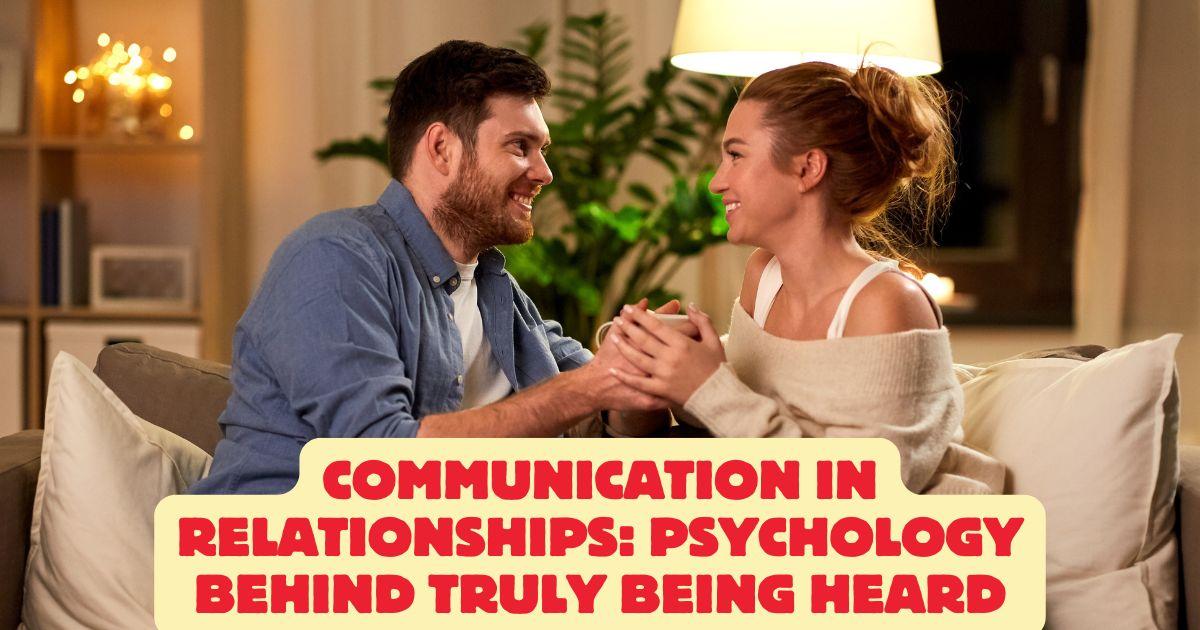Communication in Relationships: Psychology Behind Truly Being Heard

In today’s fast-paced world of digital distractions, emotional disconnect, and modern lifestyle trends, truly being heard by your partner can feel like a rare luxury. Yet at the heart of every healthy relationship lies one powerful skill: communication in relationships. More than just talking or texting, effective communication fosters deeper emotional bonds, minimizes misunderstandings, and helps partners navigate the ups and downs of love with empathy and understanding.
Whether you're in the early relationship stages or navigating the challenges of a long-term relationship, learning how to communicate with intention and presence can transform your romantic journey. Let’s explore the psychology behind authentic communication and uncover expert-backed strategies to truly connect—and be heard—in your relationship.
Psychological Roots of Emotional Connection
At its core, communication is not just about exchanging words; it's about sharing experiences, validating emotions, and building trust. According to love and relationship studies, the feeling of being understood by your partner activates the brain’s reward center, increasing feelings of security and emotional intimacy.
When partners feel truly heard, they’re more likely to express themselves openly, which leads to fewer conflicts, quicker resolutions, and a happier, more satisfying relationship. Happy relationship tips often emphasize the value of “feeling seen” over “winning” an argument. In many ways, what we seek in love mirrors what many seek in hobbies like reading a hookah guide—deep knowledge, attention, and intentionality. These insights often reflect what you'd find in a love and romance article centered on lasting intimacy.
In fact, clinical psychologist Dr. Sue Johnson, developer of Emotionally Focused Therapy, argues that emotionally responsive communication is the foundation of lasting love. Without it, couples may feel distant—even when they're physically close.
Why Most Couples Struggle to Communicate
Despite its importance, communication remains one of the top challenges in romantic partnerships. Many people assume that talking more means better communication, but quantity doesn’t equal quality.
Common barriers include:
-
Listening to respond instead of to understand
-
Making assumptions rather than asking questions
-
Allowing past resentments to cloud present conversations
-
Using social media as a replacement for real dialogue
In fact, many modern relationship advice columns now caution against over-reliance on texting or Instagram Stories as a form of connection. The truth is, social media and relationships can become emotionally draining if partners use digital platforms to avoid real-world conflict or vulnerability.
This issue becomes even more pronounced in long distance relationships, where miscommunication can easily spiral into insecurity. If you’re seeking long distance relationship advice, it starts with being intentional about how, when, and why you communicate.
Therapist-Recommended Strategies for Truly Being Heard
So, what can you do to ensure your partner feels heard—and hears you in return? Here are therapist-endorsed strategies to improve your communication in relationships:
1. Practice Active Listening
Instead of planning your response while your partner speaks, focus fully on what they’re saying. Use verbal nods like “I hear you” or “That makes sense” and reflect back key points to confirm understanding.
Example: “So, you felt hurt when I didn’t check in last night?”
This method fosters emotional validation and reduces the chances of defensive reactions. It's also a golden rule in healthy relationship tips. Many latest relationship blogs cite active listening as a foundational practice for deep love, especially those offering modern relationship advice for couples in all phases.
2. Use “I” Statements
Rather than saying, “You never listen,” try “I feel ignored when I’m not acknowledged.” This shifts the tone from accusatory to introspective and opens the door to collaboration, not combat.
3. Set Intentional Check-Ins
Schedule weekly or biweekly moments to connect intentionally—free from distractions. This is a must for couples in long distance relationships or those juggling hectic schedules.
It’s similar to what you’d find in a love and romance article, where thoughtful gestures are seen as fuel for connection. You’ll also find parallels in online dating tips, which emphasize the power of consistent connection, especially early in a relationship.
4. Understand Communication Styles
Some people are expressive, while others are reserved. Identifying and respecting your partner’s communication style is essential to bridging emotional gaps. Reading the best hookah blogs together or discussing shared interests can surprisingly act as practice grounds for open communication. This is especially true in couples who bond over lifestyle topics found in modern lifestyle trends.
5. Validate Before You Solve
Sometimes, your partner doesn’t need solutions—just empathy. Before offering advice, ask: “Do you want comfort or a solution right now?” This can radically shift the tone of difficult conversations.
Building Trust Through Empathy and Vulnerability
Empathy is the heartbeat of connection. When couples create a safe space to share emotions without judgment, they foster trust. Vulnerability, in this sense, becomes an invitation to connect more deeply.
Many healthy relationship signs revolve around the ability to share without fear—whether it's a fear of rejection, ridicule, or being misunderstood.
In contrast, couples who shut down or avoid difficult conversations may experience emotional distancing. This is where relationship advice from therapists often emphasizes the role of curiosity: instead of reacting with anger or assumptions, ask with empathy. This mindset is echoed in countless love and romance articles.
Communication Tips for Long-Term Love
Sustaining a meaningful connection over years—or even decades—requires intentional effort. Here are some long term relationship tips to keep your communication strong:
-
Revisit conversations you had early in your relationship to see how your views have evolved.
-
Be generous with appreciation. Expressing gratitude daily strengthens bonds.
-
Laugh together. Humor creates lightness and emotional closeness.
Research in love and relationship studies shows that couples who maintain playful, open communication tend to experience longer-lasting emotional satisfaction.
Even reading online dating tips—though seemingly designed for early dating—can help reignite fresh energy in a seasoned relationship. This advice is often echoed in both casual dating columns and more seasoned modern relationship advice.
Role of Communication in Conflict Resolution
Arguments are inevitable. But how couples handle them determines the longevity of their relationship.
Healthy couples use conflicts as opportunities to grow, not attack. If you’re looking for happy relationship tips, remember: it’s not you vs. your partner—it’s both of you vs. the problem.
This mindset shift promotes collaboration and reinforces the idea that you're on the same team. Even during heated arguments, showing respect and sticking to the issue (rather than dragging in the past) helps maintain emotional safety.
If you’ve followed online dating tips and found someone special, nurturing communication will be the most powerful tool to build something lasting. Consider sharing meaningful moments through hobbies like exploring the best hookah blogs or creating a relaxing environment inspired by a hookah guide.
How Communication Evolves Through Relationship Stages
As relationships evolve, so do communication needs. Early on, excitement fuels constant updates and playful chats. But over time, it’s easy to take connection for granted.
During the relationship stages, from attraction to commitment, your ability to adapt how you communicate can prevent emotional drift. Make it a point to check in regularly—even when things seem “fine.”
After all, silence can sometimes signal stagnation, not peace. Many couples benefit from shared rituals—like smoking hookah or exploring a hookah guide together—which foster light and meaningful bonding moments. These lifestyle choices are often highlighted in modern lifestyle trends blogs as ways to maintain connection.
Integrating Emotional Intelligence into Your Daily Conversations
Incorporating emotional intelligence means recognizing your emotions, managing them appropriately, and reading your partner’s cues with empathy.
This aligns closely with what many latest relationship blogs now emphasize: that effective communication is less about saying the right thing and more about saying it with awareness, intention, and heart.
And while it might seem unrelated, even habits like reading best hookah blogs or enjoying activities inspired by modern lifestyle trends together can spark playful conversations that deepen your connection. As unusual as it may seem, these shared interests can support emotional closeness.
FAQs About Communication in Relationships
Q1: What is the most important element of communication in relationships?
A: Active listening is key. It helps build trust, avoid misunderstandings, and foster deeper emotional intimacy.
Q2: How can communication help in a long distance relationship?
A: Regular, intentional check-ins, video calls, and honest emotional sharing can bridge the physical gap and keep partners emotionally close.
Q3: Can social media hurt communication in relationships?
A: Yes, relying too much on digital communication or comparing your relationship online can lead to emotional disconnect and unrealistic expectations.
Q4: How do you know if your relationship has healthy communication?
A: If both partners feel heard, respected, and safe sharing their feelings, that’s a strong indicator of healthy communication.
Q5: What are some simple, daily communication habits for couples?
A: Expressing gratitude, validating emotions, and asking open-ended questions like “How’s your heart today?” are powerful habits.
How do you and your partner make sure you're truly hearing each other—not just speaking? Share your thoughts and stories below!







